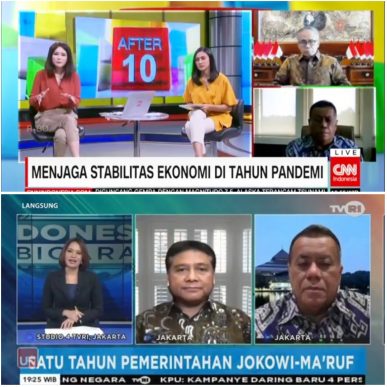UI Rector Discusses One Year of the Joko Widodo-Ma’aruf Amin Government, on CNN Indonesia and TVRI
Nino Eka Putra ~ PR of FEB UI
DEPOK – (20/10/2020)
On 20 October 2020, the administration of President Joko Widodo – Vice President Ma’ruf Amin became exactly one year old. Professor Ari Kuncoro, Rector of Universitas Indonesia, in the After 10 dialogue on CNN Indonesia and Indonesia Talk on TVRI discussed what needs special attention.
After 10, CNN Indonesia, “1 Year Jokowi-Ma’aruf – Maintaining Economic Stability in the Pandemic Year” Tuesday, 20 October 2020
Professor Ari Kuncoro, Rector of Universitas Indonesia, in the After 10 CNN Indonesia event, discussed 1 Year Jokowi-Ma’ruf, with the topic “Maintaining Economic Stability in the Year of the Pandemic” with news presenters Ratu Nabila and Maggie Calista, on Tuesday (20/10 / 2020). In the interview, Ari conveyed that signs of de-globalization began to appear in 2017, as the US-China trade conflict caused an economic slowdown. Covid-19 provided a yellow light warning for Indonesia’s future economy. So far, we have relied less on the domestic economy and more on imports and short-term capital flows. The government must encourage domestic production, and the pandemic should become a momentum to improve the domestic industry so that we can enter into the global production-based radar.

According to Ari, the Omnibus Law, which is currently being discussed, is actually aimed not only at attracting foreign investment, but most importantly domestic investment. Historically, we have experienced a commodity bonanza from 2004 – 2013, with a large amount of foreign exchange income injected into the domestic economy and only the trade and construction sectors were prominent, not the manufacturing sector. This is a sign that industry is more expensive than trading. This makes us only used as a market by neighboring countries. With the inauguration of the Omnibus Law, industry is cheaper, thereby arousing domestic industry, opening up new jobs, strengthening supply chains, and creating leverage in the form of income.
“The National Economic Recovery (PEN) shows a trend towards the ‘W curve’, meaning that the tail is not too sharp, but rather flat. To be sharp, we have to strengthen domestic production, so that the leverage is great. This must be fixed by the government immediately. Meanwhile, with the Covid-19 vaccine, the Indonesian economy in the first quarter of 2021 should show an upward direction, supported by a sense of public confidence returning to normal for consumption, shopping transactions, traveling, and other activities,” explained Ari.
Indonesia Bicara, TVRI, “One Year of Jokowi-Ma’ruf Administration” Tuesday, 20 October 2020
Professor Ari Kuncoro, Rector of Universitas Indonesia, at the Indonesia Talk TVRI event, with the topic “One Year of Jokowi-Ma’aruf Administration” with news presenter Nurul Jamilah, on Tuesday (20/10/2020), said the Jokowi-Ma’ruf Amin administration actually wants to change the configuration of the economy, which has so far relied on capital inflow. With the US-China trade war and Covid-19, we must start thinking about other ways to develop Indonesia through increasing productivity. Productivity has started with infrastructure development and it remains only to improve the business environment. We must turn the economy from relying on macro stability to become a center of production.

Since being inaugurated in October 2019, the government of President Joko Widodo – Ma’ruf Amin has been faced with the necessity of reorienting the industrialization strategy. Globalization allows Indonesia to rely on the world commodity cycle, relying on macro stability to attract portfolio capital inflows to finance its current account deficit. The Covid-19 pandemic has made not only the de-globalization process stronger, but also the decoupling of the world economy.
On the other hand, continued Ari, industry seems to be more expensive than trading. The cost of starting a business in Indonesia is ranked 67th out of 141 countries. The convoluted permit issuance procedures are reflected from the time of starting the business, which was ranked 103rd. One of the things that is considered positive is the skills of the workforce, which is ranked 36th and can still be improved. However, this was corrected downward because the labor market was too stiff so it was only in the 119th position. Apart from the pros and cons, the Job Creation Bill has the opportunity to prepare Indonesia to face a new world order that leads to de-globalization.
“To create economic opportunities in the future, Indonesia must be attractive and creative, such as the omnibus law, and tax efforts, which can put our country on the world’s radar. So, investment from abroad can enter and provide feedback to the domestic industry. This is a timeline normally taken by developed countries, such as Korea, Japan, China and Taiwan, ” Ari said in closing the session. (hjtp)
Photo in After 10, CNN Indonesia, “1 Year Jokowi-Ma’aruf – Maintaining Economic Stability in the Year of the Pandemic”






